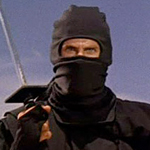 “You know, loners don’t go too far in this outfit.”
“You know, loners don’t go too far in this outfit.”
AMERICAN NINJA is a Cannon Films classic starring model-turned-action-star Michael Dudikoff as army-rookie-with-a-mysterious-ninja-past Joe Armstrong. I already reviewed it several years ago and in my opinion it was a well-written review with some points and some jokes that I wouldn’t have thought of now. For example I said that the ninjas in the yellow costumes would be good at hiding in a banana tree or a field of dandelions. You gotta have that youthful eye of the tiger to come up with that one.
But today I am revisiting AMERICAN NINJA for an important new series in which we will compare each installment of Francois Truffaut’s Antoine Doinel series to each installment of Golan and Globus’s AMERICAN NINJA series. Why, does the AMERICAN NINJA series follow the same character as he ages? Well, not really, I don’t think so, but I can’t think of a better pairing of quintologies to represent the full spectrum of cinema art from the respected and high brow (“brilliantly and strikingly reveals the explosion of a fresh creative talent… a picture that encourages an exciting refreshment of faith in films” wrote Bosley Crowther in The New York Times) to the… other kind (“Woefully acted, abysmally written… an embarrassment even when held to the low standards of grade C exploitation movies” wrote Candice Russell in The Sun Sentinel). By alternating between them and comparing and contrasting how they approach each chapter I hope we’ll find the true meaning of art or whatever.
Joe begins the movie as some kind of cool James Dean type, leaning and flipping a switchblade and not responding when the others try to get him to join in a hacky sack game.
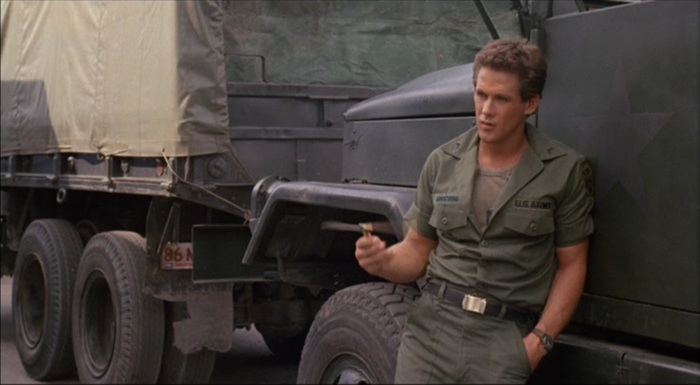
Put a Balzac book in his hand and that’s gotta be how non-sports-liking Antoine sees himself, right? Antoine likes to pull his turtleneck up over his mouth, a reference to famous photos of James Dean; Dudikoff was cast specifically because he resembled Dean.
This cool non-hacky-sacking quiet loner is sent with a convoy of trucks delivering supplies when they’re stopped by construction workers who then pull out machine guns and try to steal the trucks.. When he sees the Colonel’s daughter Patricia (Judie Aronson, FRIDAY THE 13TH: THE FINAL CHAPTER, DESERT KICKBOXER, KISS KISS BANG BANG) being roughed up he intervenes. She tries to drive off, but crashes the car.
Joe leads the other soldiers in fighting back, and demonstrates a bunch of somersaulting and throwing skills. We see that he’s being observed from a distance by a full on ninja (Tadashi Yamashita, BRONSON LEE: CHAMPION, THE OCTAGON, GYMKATA) hiding in the trees. He has a tattoo next to his eye that gives him the name “Black Star Ninja.” “He possess great skills,” Black Star Ninja later says of Joe.
This turns into a serious ninja battle with arrows, bladed spears, shurikens and some of that energy of the NINJA III opening golf course massacre. Joe gets to do a RAIDERS OF THE LOST ARK stunt where he’s dragged behind a moving truck (later he’ll have a separate incident riding under a truck). He somersaults onto the top, swings a chain and hook through the windshield, hooks it onto the steering wheel which he yanks and jumps off and the truck crashes and explodes and this is why we watch movies with NINJA in the title in my opinion.
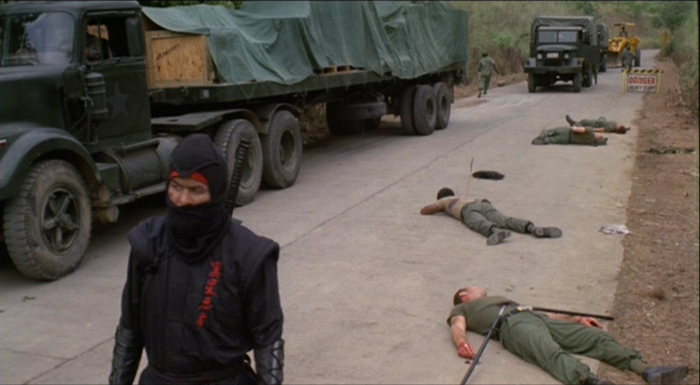
When Joe takes off into the woods with the girl he does not demonstrate keen social skills. He doesn’t bother with a “It’s gonna be okay” or “My name is Joe” or “let’s go this way” or anything. He just covers her mouth, breaks the heels off of her favorite shoes and cuts her skirt into makeshift pants. Obviously she’s real upset about being treated this way, but after she sees him shirtless she starts liking him.
Joe absolutely saves the day, but just like Antoine he’s always gonna get a bunch of shit from the authority figures no matter what he does. Case in point: Patricia’s dad, Colonel Hickock (Guich Koock, “Hot Jock #2,” THE SUGARLAND EXPRESS)’s thank-you for heroically bringing back his daughter alive is to say “I suppose you think you’re a hero just because you brought back my daughter alive.”
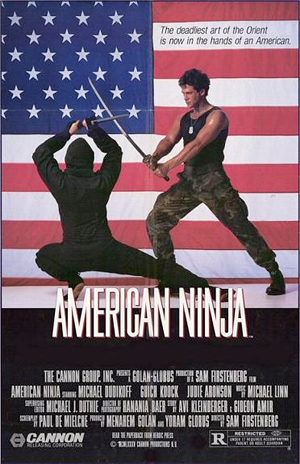 Like Antoine, Joe is basically a good kid who’s been given a raw deal in life and has a bad reputation because of the trouble he’s gotten into in the past. They think he’s AN ANGEL FACE HELL-BENT FOR VIOLENCE! Instead of sending him to reform school they sent him to the Army. Within the army his superior officers hate him and give him shit for everything, just like Antoine’s teacher. For example when Curtis Jackson (the great Steve James, HOLLYWOOD SHUFFLE) starts a fight with him, it’s Joe who gets punished. One very minor difference is that they hate him partly for interfering with their illegal operations, and they keep sending ninjas to try to kill him. While Antoine gets busted when he steals a typewriter, Joe is busted on a false accusation of stealing a truckload of Army weapons. In fact the people blaming him have been stealing and reselling the weapons themselves.
Like Antoine, Joe is basically a good kid who’s been given a raw deal in life and has a bad reputation because of the trouble he’s gotten into in the past. They think he’s AN ANGEL FACE HELL-BENT FOR VIOLENCE! Instead of sending him to reform school they sent him to the Army. Within the army his superior officers hate him and give him shit for everything, just like Antoine’s teacher. For example when Curtis Jackson (the great Steve James, HOLLYWOOD SHUFFLE) starts a fight with him, it’s Joe who gets punished. One very minor difference is that they hate him partly for interfering with their illegal operations, and they keep sending ninjas to try to kill him. While Antoine gets busted when he steals a typewriter, Joe is busted on a false accusation of stealing a truckload of Army weapons. In fact the people blaming him have been stealing and reselling the weapons themselves.
But the attitude spreads to the soldiers. They make fun of him for his heroic actions. “Hey, uh, Joe Hero. Did you make out with the princess?”
He’s very lucky that Curtis picks a fight with him, and that he takes the time to hand Curtis’s ass to him. Joe puts a bucket over his own head and kneels down and still subdues Curtis in front of everybody. This way they become Fight Brothers. Curtis shakes Joe’s hand, admits he was wrong and makes an announcement that Joe is a good man. Curtis is Joe’s Rene. I mean, he’s way cooler than Rene, but like Antoine and Rene these two do their sneaky business together and try to cover for each other and back each other up.
Curtis has too much swagger to quite seem like the sidekick. He’s an equal partner in all but screen time and credits order, but he’s very much in awe of Joe’s skills. “You didn’t learn that from the streets. I’m from the streets.” (In reality James was a martial artist and Dudikoff wasn’t, causing some tensions on set.)
Like Antoine, Joe doesn’t know his biological father. In fact he remembers very little about his youth, because he came to the army with amnesia. It turns out that the villain’s gardener Shinyuki (John Fujioka, AMERICAN YAKUZA, PEARL HARBOR) raised him. He found Joe as a baby, became his guardian and trained him in ninja techniques. This seemed real familiar to me, not because I had seen AMERICAN NINJA before, but because since then I had seen AMERICAN SAMURAI. In that movie a character played by David Bradley (who will eventually sub for Dudikoff in AMERICAN NINJA 3) has a very similar backstory, he was found by a character named Tatsuya who is also played by John Fujioka, and who trained the baby in samurai techniques, like some sort of alternate dimension version of this story. But for the American Samurai the abandoned white baby situation is a little less mysterious: his parents crashed a small plane into a tree, and he survived. I’m not sure if this Fujioka character checked the trees or not.
I’m very unclear on the explosion part of the backstory. Young Joe got separated from his master by what appeared to be a small detonation for construction or something. Then he got amnesia. It’s not explained very clearly, but I guess it adds to his mystique. The end credits suggest that I “READ THE PAPERBACK FROM HEROIC PRESS,” which would probly be illuminating on this topic, but I’ve done some searching and I’m not convinced a novelization was ever actually released.
In THE 400 BLOWS Antoine was sort of pitted against his stepdad, because he tried to steal his typewriter. In this one the protagonist is pitted against his girlfriend’s dad, who he doesn’t realize is involved in the weapons smuggling until the guy screws him. He does have some regrets, though. The real villain is the guy he made a deal with, Victor Ortega (Don Stewart, CARNIVAL MAGIC, ROVER DANGERFIELD). He’s a classic old-guy-in-suit villain with a mansion that includes an amazing training camp for ninjas in a variety of colors. This is an important staple of Americanized ninja movies. I respect it.
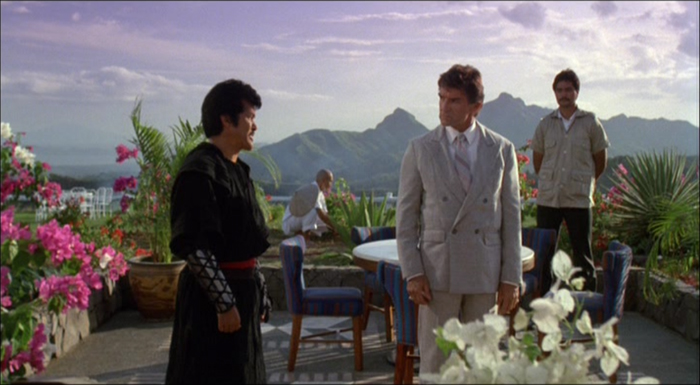
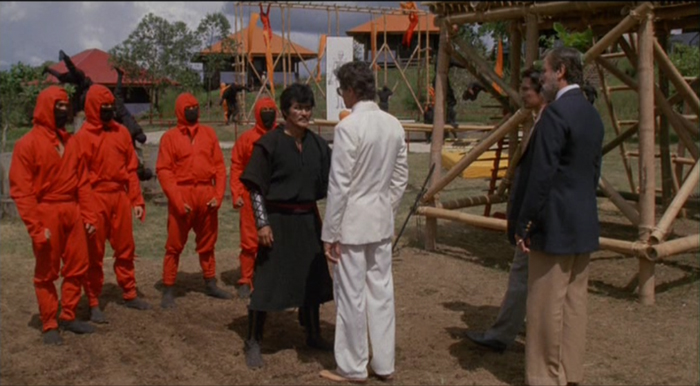
Another one: the ninja is out of costume for much of the movie, but suits up for the climax (allegedly why Chuck Norris wouldn’t do the movie). Dudikoff does well because his eyes are actually recognizable behind the mask.
THE 400 BLOWS was Jean-Pierre Leaud’s first lead role (he’d only been in KING ON HORSEBACK before), and launched him into stardom. Dudikoff had been acting for around 8 years before AMERICAN NINJA, but almost entirely as a TV guest star or hard-to-spot bit part (like in BLOODY BIRTHDAY, TRON and UNCOMMON VALOR). The only exception was Albert Pyun’s RADIOACTIVE DREAMS, which came out the month before this but made less of an impression, playing on almost 600 fewer screens.
Director Sam Firstenberg grew up in Jerusalem, and like Truffaut he obsessively went to the movies, especially American ones. Also like Truffaut he had a brief stint in the military, in his case three years in the Israeli army. Firstenberg’s directing career began near the end of Truffaut’s. After several years as an assistant director for Menahem Golan, Firstenberg’s master-thesis-turned-feature-film ONE MORE CHANCE debuted at the 1981 Cannes Film Festival. He followed that with a trilogy of sequels (REVENGE OF THE NINJA, NINJA III: THE DOMINATION and BREAKIN’ 2: ELECTRIC BOOGALOO) before kicking off the AMERICAN NINJA series in 1985.
According to a biography on Firstenberg’s official websight, “Sam is particularly drawn to a style of cinema he calls ‘poetic realism’ – telling realistic stories with poetic images.” It quotes him as saying that “As opposed to an artistic, European type of filmmaking, I have always been attracted to mainstream American cinema – the type of movies made by Hitchcock, John Ford, and Akira Kurosawa. I see my responsibility as a storyteller, using cinematic means rather than lengthy dialogue. I like fast paced attention grabbers and dramatic, exciting stories.”
Truffaut may be an example of the “artistic, European type of filmmaking,” but he shared Firstenberg’s love of Hitchcock, and even published a book of his interviews with the master.
Of the two, Truffaut would go on to have what is usually considered a more influential body of work. But that’s not taking into account the role Firstenberg had in popularizing ninjas in America. That’s got to count for something.


























May 17th, 2016 at 12:43 pm
Interesting premise for a series. I will make sure to rewatch the AMERICAN NINJA franchise along with it as well as take a gander at the Truffaut stuff since I’ve overlooked it for many years and this is an inspiring enough reason to finally dive in.